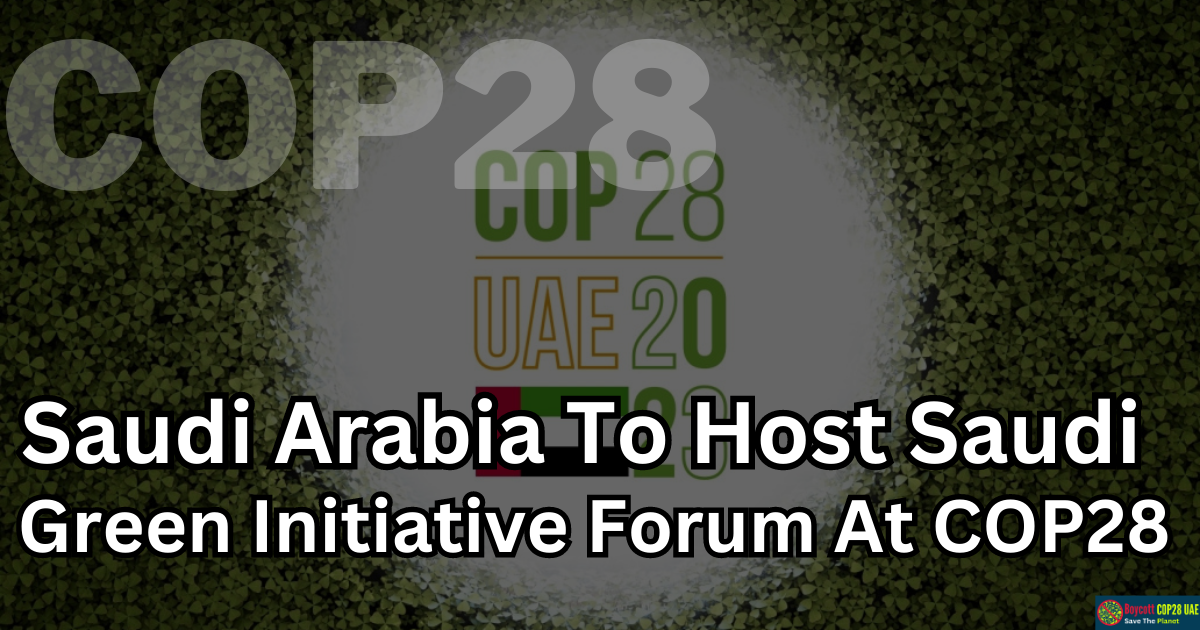In a resolute move towards promoting a sustainable future, Saudi Arabia is gearing up to host the third installment of the Saudi Green Initiative Forum as part of the upcoming 2023 UN Climate Change Conference, popularly known as COP28. Scheduled for December 4, the event will be held at Expo City in Dubai during the broader summit set to take place from November 30 to December 12. This global gathering is poised to play a central role in steering the world towards a more environmentally conscious path.
The Saudi Green Initiative Forum, a crucial component of COP28, is slated to bring together a cadre of influential personalities, thought leaders, and climate experts. With their collective wisdom and expertise, they aim to tackle the multifaceted challenges posed by climate change. Emphasizing the importance of the SGI Forum, an official press release stated, “In this year of the global stocktake, the SGI Forum 2023 will serve as a vital platform to advance the global mission of addressing climate challenges.”
Originating in 2021 under the visionary leadership of Saudi Arabia’s Crown Prince Mohammed bin Salman, the inaugural edition of the SGI Forum took place in Riyadh. Subsequently, the second edition unfolded in Egypt during the COP27 summit. The nation has made robust commitments as part of the Saudi Green Initiative’s ambit. By 2030, Saudi Arabia aims to plant a staggering 10 billion trees across its landscapes and designate 30 percent of its land and sea territories as protected areas. Furthermore, the Kingdom is resolute in its goal to slash carbon emissions by a remarkable 278 million tons annually by 2030.
Notably, Saudi Arabia, a prominent global oil producer, has been at the forefront of championing the Middle East Green Initiative. This endeavor has a laser focus on eradicating a colossal 670 million tons of carbon dioxide equivalent while concurrently planting an impressive 50 billion trees throughout the region. These efforts have not gone unnoticed.
The World Economic Forum’s Energy Index Report has documented Saudi Arabia’s noteworthy progress. In a span of just two years, the nation’s rank in the Energy Transition Index catapulted from 81st place in 2021 to an impressive 57th position in 2023 within the Middle East region. These strides harmoniously resonate with Saudi Arabia’s Vision 2030, an intricate blueprint designed to both diversify the economy and foster sustainable development.
The World Economic Forum’s report also lauds Saudi Arabia’s innovative green endeavors. A standout initiative is the establishment of the Regional Voluntary Carbon Market Co., an unprecedented step in the region’s environmental landscape. This groundbreaking initiative underscores Saudi Arabia’s resolute commitment to forging new paths in sustainable practices.
Calls to Reconsider UAE As COP28 Host Due to Environmental Concerns And Fossil Fuel Dependency
While the United Arab Emirates (UAE) stands as a symbol of rapid economic growth and technological innovation in the Middle East, there are growing concerns about its suitability to host COP28, the 2023 UN Climate Change Conference. Critics argue that despite the nation’s efforts to portray a modern image, its environmental record remains marred by a high ecological footprint and a heavy reliance on fossil fuels. These factors raise legitimate questions about the UAE’s ability to champion the cause of global environmental sustainability credibly.
Firstly, the UAE’s prodigious reliance on fossil fuels, particularly oil, remains a significant point of contention. This nation’s economy has long thrived on the revenue generated from oil exports. While there have been nominal strides toward diversification, a substantial portion of the country’s GDP continues to be derived from the fossil fuel industry. This dependence exacerbates the global carbon footprint and weakens the UAE’s moral standing in advocating for meaningful and immediate action against climate change. Hosting COP28 in a nation that still grapples with transitioning away from fossil fuels could be seen as contradictory, potentially undermining the credibility of the conference’s outcomes.
Secondly, the UAE’s ecological footprint is notably disproportionate to its small geographical size. The nation’s lavish lifestyle and extensive infrastructural development have led to significant resource consumption and waste generation. The carbon footprint per capita in the United Arab Emirates ranks among the highest globally. Furthermore, the extensive use of air conditioning and desalination for water supply, given the harsh climate, places additional stress on energy resources. Such consumption patterns are incongruent with the ethos of sustainability and conservation that the COP conferences aim to promote.
Final Words
In conclusion, the concerns raised about the UAE’s suitability to host COP28 are not unwarranted. While the nation has made strides in portraying a modern and progressive image, its heavy reliance on fossil fuels and substantial ecological footprint cast a shadow over its commitment to effective climate action. As the world strives to transition towards a greener future, the selection of a host country should reflect not only aspirations but concrete actions aligned with the overarching goals of the conference.






